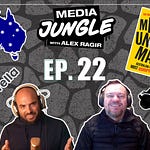Subscribe to Apple Podcasts, Spotify, Google Podcasts, Stitcher, and everywhere you listen to podcasts (if you like the show, leave us a review!). Not much time? Watch short clips on TikTok, Instagram, and Youtube.
Welcome back to Media Jungle! We want to give a special welcome to new subscribers from Twitter, The Defiant, LA Times, Washington Square Films, and more. Simply respond to this email if you have any feedback…
We have a great episode this week with:
Steve Waldman (@stevenwaldman) : Co-founder and President of Report for America and the Save Local News Coalition.
Podcasts grow from referrals, so if you like Media Jungle, please consider sharing with someone interested in learning about the media industry.
Read the transcript of the full interview below. Or watch the full episode on our Youtube channel here:
Missed last week’s show? Here are some clips from our episode with Mark Little, CEO and co-founder of Kinzen:
Here’s a transcript of this week’s episode:
Alex: Welcome to the Media Jungle video podcast. I'm your host, Alex Ragir, coming to you every week to break down the business behind the news industry, the future of media, and the creator economy. Subscribe to our Substack newsletter and YouTube channel, and don't forget to leave a review on Apple Podcasts. If you like the show, we appreciate your support.
On this episode, I'm joined with Steve Waldman, a man on a mission to fix journalism. Co-founder of report for America, which [places hundreds of] young journalists and newsrooms to cover under-reported stories. He’s also the founder of Rebuild Local News Coalition representing over 3000 locally owned and nonprofit news organizations across America.
Steve, so glad to have you.
Steve: Thank you so much for having me. It's a big topic.
Local News Matters
Alex: Local news matters. I know a lot of you guys are thinking “local news was never good, and the newspapers look like teeny-tiny little tabloids now,” and it's true, but at least the politicians who someone was watching. Now there's more than a thousand “news deserts” in America, meaning no reliable local news telling you where your tax money’s spent, who polluted the water, which politicians are lying. And there's so many studies that say at a decline in local news increases corruption and wasteful spending. You've got more radical politicians. They just watch the national news for talking points and the people vote less. They think their vote doesn't matter. The real news is still trapped behind a paywall and still 71% of Americans don't even know that their local news is disappearing. (Well, now *you* know.)
Steve, maybe you could give us a little bit of background and overview about the gravity of this crisis and where you're seeing local news solutions and why you've sort of dedicated your life to this.
Steve: Well, you had just a great summary and you’re right. Most people when you talk to them about a collapse of local news, they look at you like “What are you talking about ‘collapse of news?’ I'm flooded with news, there's news everywhere.” It doesn't feel like we're in a shortage of news moment, but while there's an abundance of national news and social media, there is actually an extreme shortage of local reporting. And just as a comparison, there's been a [26% drop] in the number of reporters just in about 15 years. That's an incredibly sudden dramatic contraction. And as you said, in addition to that, there are all these thousands of news deserts where there's nothing going on. And then there's another several thousand that are, there's a term of art called “ghost newspapers,” and that's basically newspapers [that are] still publishing, there's still pieces of paper with words on them and websites, but the level of local coverage is low. There's a study that showed that 17% of the articles in a local newspaper are local, and that just gives you a sense that it's just evaporated in a lot of places. And as you said, more corruption, lower voter turnout, higher taxes, more pollution. That's all true, that’s all associated with what happens when you have less local news. So the vacuums are being filled and they're being filled by national media that's more polarizing, by social media, by misinformation. In other words, the collapse of local news is also connected to this other set of problems that I know you've talked about in other contexts of misinformation and polarization and things like that.
Alex: Maybe you could give an example of something that would’ve been covered now that would have been covered if local news was there and how that really could affect Americans.
Steve: Whether the schools have decided to close a bunch of schools, or spend less money on special education, or where the COVID testing areas are, or whether the mayor is actually doing what she said she was going to do. There's a famous example in California, kind of an extreme version, but in Bell, California, there was a community working class community that had no newspaper. Since no one was showing up at the city council meetings, they just kept voting themselves pay-raises to the point where the city manager is getting paid $800,000 a year. And it wasn't illegal. It wasn't done on a parking garage, under the hidden stealth mode with people with trench coats; they were doing it at the city council meeting. But there was no one there. And we don't really know all the examples like that that are happening because there's no one there. So it's a little bit of a “we don't know what we don't know” but there's overwhelming evidence that, from not just here but around the world, that when you have this, it leads to more corruption.
Alex: Why exactly that connection between voting and local news engagement? Is that because people just get nihilistic and say, “This is just complete trash. Like, why do I even care?”
Steve: That's a great question. I think some of it is even more pedestrian than that. It's just that you don't hear about it. You don't hear about the election at all. It's nothing interesting or exciting about it cause you don't even know it exists and you don't feel any investment or you may feel like, “I don't know anything about any of these people. I don't even wouldn't even know how to base my votes.” That's one level, but I also think it's what you said is that there are certainly are studies, and this feels intuitively right, that says when there's less local news, people in general feel more alienated from their communities. They just feel ineffective. That actually is connected to how much local news there is, and if you're feeling ineffective and alienated, then you're also going to feel nihilistic and not bothered to vote.
Alex: It is so true that the whole political debate has become so nationalized, right? It's like people are talking about these national issues, which a lot of times are these abstract issues, that are not necessarily going to affect your day-to-day. It's more like “this is how I identify with this side I identify with that side.”
Steve: Right. It's more what tribe you’re in. One other effect of that is that, when you're dealing with national issues, it's easier to demonize your opponents. It's easier to view them as cartoon characters because they're abstract. They're far away. They're in that community, across the country that's doing crazy things. And it's not like local news isn't controversial. Local news can be really controversial, but it's a different sort because first of all, you're seeing the person face to face. And that same person who you might be disagreeing with about the school board thing, you may be seeing them at the soccer match that Sunday or you may be agreeing with them on a different issue because the issues don't fall on a left/right, you know, MAGA/non-MAGA spectrum. It can still be very controversial, but I think you're a little less likely to completely de-humanize your opponent and a little less likely to become quite as vicious and polarized.
Alex: So it's more kind of something that you actually both care about and you all kind of want your city to do better. You want your politicians to do better. You can all agree on that.
Steve: Filling potholes is not really a democratic or republican issue, and a lot of the issues that come up locally just split along different lines than they would nationally. And it's true that people know that you're the person who's disagreeing with you, they're doing it because they care about the community. Whereas on the national level, it's “you're the enemy.” The people who disagree with you hate you, and they hate your country. It's not like “Well, we all want the same thing or the best for the country.” That seems to be gone. Now it's the people on the other side of this that are trying to destroy the country.
Alex: How did it get so bad in terms of the business model? People always say, “Craigslist came and destroyed local newspapers because they didn't have classifieds.” Was it that simple or were there other factors?
Steve: That was kind of the first step, but even looking back, the internet did break the local news business model. Because the way I like to think about it is in the olden days, which isn't that long ago [15 years ago], advertisers supported local news because the way to reach your customer was to be next to local content. And now if you're an advertiser, you can reach your customers in all sorts of other ways. So initially, yeah, Craigslist was like the first example, but it wasn't just Craigslist. Those early days of the internet, it was like Monster.com took away the job ads, Autotrader took away the car ads. LinkedIn took little by little. The ad model of a newspaper got kind of picked off by different parts of the internet. Then Facebook and Google came along and just accelerated basically the same phenomenon. All these local businesses that used to advertise in papers now don't, and this is like to an 81% drop in advertising revenue for local newspapers. 81% in less than two decades.
Alex: People called it a monopoly on distribution. They were the only way you could really get in touch with that many people was through newspapers or TV on local stations. [That] supported quality journalism in a lot of cases.
Steve: Yeah, and that's why I don't tend to be moralistic about the companies that came along, Craigslist or whatever. You could argue the newspapers were using their monopoly status to charge way more than they should have been, and Craigslist broke the monopoly. I don't think of it necessarily as like the tobacco industry or something coming in [being] nefarious, but this is just the reality. That this new world, the internet, had all these great advantages, but a massive unintended consequence of the whole thing was the destruction of the business model for local news.
Alex: Which is a good segue to the next segment.
Pink Slime News
Alex: Pink slime news. Remember when McDonald's got caught filling its hamburgers with pink slime to save money on real beef? That's what's happening in the news industry right now. Over 2000 newspapers have shut down since 2004, but Americans are still hungry for news about the place they live. So to fill the vacuum, more than a thousand faux news sites, masquerading as local news, have popped up funded mostly by conservative think-tanks, a few liberal ones, along with PR firms and whoever wants to influence you. I got beef with these pink sign websites. You should too.
Alex: Steve, talk to us about how big this problem is and how we can prevent it.
Steve: The vacuums that we talked about when the collapse created these vacuums, one of these forces that is flooding the vacuum are these pink slime websites. And pink slime is a little bit of a catch-all phrase for a few different types of unfortunate actors. So you have political partisan ones, and they're basically saying, “Oh, there's no local newspapers here. We can pretend to be a local newspaper and we'll be more credible.” And it allows some local news for it, but mysteriously, the articles about that member of Congress will always be positive about that member of Congress. Everything else is actually straight. So that's one kind of thing. And as you said, it's political money, so far it's more conservative, but there's definitely some that's progressive, and my guess is the progressives are going to try to catch up. So that's one group. Then you have this group, you mentioned the PR firms that’s sort of pay-for-play. And this is maybe non-ideological, but kind of nefarious in its own way. [It’s] like you own a hotel, you pay the local news site to write a great article about the hotel, and it runs, but it's not labeled as an ad. It looks like an article, [like] the newspaper happened to do an objective story about how this is an awesome hotel, and it's not disclosed that they paid for it. It's really an ad, but it's not disclosed as being an ad. I think pay-for-play is kind of the way I think of it. as it's driven by non-disclosed ad money and those are like the two big buckets of these pink slime sites.
Alex: And so there's these two buckets. Is there any ways that we can fix it?
Steve: One level, if you go back to the vacuum metaphor, is we have to fill the vacuums with actual journalism and journalists. I think that's the most important thing is to just get more local journalists out there. And there's lots of ways of doing that. There's lots of different formats for websites and public radio stations and for-profits and nonprofits, but the bottom line is more local reporters. And so the program that I run is called Report for America, and that's what our mission is, to get more reporters out there. We have 315 reporters that we're putting in the field embedded into local newsrooms of various sorts. It's kind of like a Teach for America for journalists, sort of based on AmeriCorps and Peace Corps and stuff like that, and we have these great, spirited journalists that we put in newsrooms that we pay half the salary and the newsroom pays the other half. And that gets support from the community, from donations, to support it.
Alex: You had a grant from the government, like the Peace Corps?
Steve: No, actually. That's a great question. It's all private in our case. Our national money, the part that we're putting in, comes from foundations and donors [like] the Knight Foundation, Robert Wood Johnson, and then individual donors. We put that into the local system through subsidizing the salary of a local reporter, and then working with that newsroom to try to become more sustainable, in part by developing a philanthropic arm to their organization. That's the heart of Report for America. There's other interesting groups out there that have popped up just in the last few years that are doing, and so there's a very exciting world, actually, of social entrepreneurs that are trying to fix this system.
Solutions to Fix Local News
Alex: What are the things that normal Americans can do to help?
Steve: Well, I think at three things. One is [to] subscribe to a local something. A local newspaper. If it's a nonprofit, donate to it. That's the most important thing, because at the end of the day, you're not going to have good community journalism if the community doesn't support it. And in a way we all got used to having a free ride on this because advertisers were basically paying for it all, and that’s not true anymore. It's not that much money. When you think about how much it costs for a subscription compared to how much you pay for coffee. And there is that this philanthropic sector where people are doing donations. So if you have the resources, donate also to nonprofit news organizations or places like Report for America or local versions of that. And then I think the third thing, which is a little less well-developed but is coming, is public policy. There are some things that can be done in public policy waves, and people can split that. People can communicate with their members of Congress saying this is an important issue. We need to save local news if we're going to save democracy and if we're going to deal with the issues like healthcare and climate. It's honestly in the early stages of [regarding] People getting their hands around what kind of public policy things could you do that wouldn't make it worse and wouldn't have First Amendment problems and things like that. I'll give you one example: there's a bill called the Local Journalism Sustainability Act, and it's a really clever bill. It provides a tax credit to consumers to help them buy subscriptions, so essentially [underwriting] your subscription or a donation. It provides a tax credit to small businesses and the community that advertise in a local news something, and it provides a tax credit to local publishers to higher-retained journalists. It's pretty clever because it doesn't involve a government agency sitting there deciding to give out grants in some subjective way based on articles. It's more universal than that. [There are] more objective factors and part of that was in the Bill Back Better Act. It almost passed and it might still pass if they ever get around to doing like a mini-version that they're always talking about doing. And so my second hat, as you mentioned, is something called the Rebuild Local News Coalition, which pulls together all these [different groups] that can really help with that.
Alex: You're sort of acting as a lobby, representing those groups to try to enact policies?
Steve: Yeah, yeah. They’re also doing their own thing, but it's a way of coordinating. We do our own lobbying and advocacy and we sort of help coordinate all these other groups and get everyone working in the same direction, focused on the same thing so we have more impact.
Alex: So do you think the future of quality real journalism is nonprofit?
Steve: I think nonprofit will play a much bigger role than, than it has in the past, but I think it could be a bunch of different models. I'll give you an example: Report for America. We are a nonprofit, but we actually place journalists in both for-profit and nonprofit organizations. And the for-profits, it's kind of interesting to see how that works. Cause it's like a nonprofit injection through this person who's working in a for-profit newsroom and it kind of creates this hybrid, but it works really well. Like it ends up that they're doing these beats that they weren't doing before. Covering certain communities that had never been covered well before, and that's kind of an interesting model. It makes me think you could have some versions where you’ve got the website that [has] basically creamed off the parts of the local business that work like [things] that you can get advertised that aren't that hard. And then the philanthropic sector is kind of underwriting the more labor intensive, accountability beats. I could see some, some combos like that. And then in other places, yeah, there's some really cool nonprofit things. In other places you have the kind of billionaire owner model. That works sometimes if you've got a good billionaire.
Alex: Yeah, you're just betting that the billionaire's good.
Steve: It's not really where you want to hang your whole democracy on, but there are definitely cases like Minneapolis and Boston and Washington Post, weirdly enough, are cases where the benevolent billionaire has remained relatively benevolent and those can work out well, too.
Alex: I feel like local news has been declining for my whole life, and everyone's just like “Eh, I don't know, [no] one ever comes up with a solution.” So I feel like there's no real push for telling philanthropists that they need to put their largest into local news. There's gun violence, climate change, a lot of these big issues. It feels like there's no real movement or push.
Steve: I totally agree. It drives me crazy. [There are] exceptions. There's half a dozen foundations that are doing amazing work in this space, so what I'm about to say doesn't apply to them. But I'll give you an example: I just saw a list of the top hundred grants from “democracy” funders. These are things that are striving to strengthen democracy, right? So already you've narrowed it down to just democracy. Only one of the hundred was for a local news project. So that means the democracy funders are not even thinking that journalism is important for democracy.
Alex: Yeah, we're focusing on the short-term wins on the short term election.
Steve: And this is kind of ironic. You work on having structurally sound elections, but then no one's voting because no one knows who the candidates are.
Alex: And I feel like there's an issue too. I think that a lot of people are like, “Local news was always about ‘if it bleeds, it leads’ anyway. Why should I support that?” But the idea is if we can re-imagine local news and actually create a nonprofit of local news, then you can actually create a case study where it's like, “This is what you're paying for.” You're not paying for “the cat was lost in the tree,” like people envision of the old local news.
Steve: Right. Or in the worst-case scenario that we saw is like “all blacks are criminals.” So you're totally right that we don't want to romanticize the golden age of local news because there were lots of cases where local news was either not really covering their community or covering them destructively, in some cases. It’s a really important point that as we try to fill the void, we need to re-imagine local news also, to make it much more inclusive and better. And I do think that having a much bigger role for the nonprofit model and sector can be a very positive thing for that reason, because you are looking at it that way. “If it bleeds, it leads” doesn't work if you're trying to make a case to donors. And by donors, I don't just mean rich people. A $10 donation from someone in the community, but it's kind of the same thing. They're not going to give for “If it bleeds, it leads” either. They're going to give their $10 if they feel like you're covering the schools better. Having that little extra philanthropic motivation to it can pull the system in a better direction.
Alex: Maybe you could even fund beats. Like the education beat.
Steve: That's actually, interestingly, [the] way we do it with Report for America. It's all beat-based, and what we find is that when they then go out to pitch the community, help us support this Report for America position, they do it exactly the way you just said. It's not abstract “save democracy,” it's “we have someone covering the schools now. Here she is. Here are the pieces she's done. Here are the pieces that literally would not have happened about your schools if we didn't do this, so help support us.” [That's] a much more compelling pitch than general “Help us. The news organization. We're sad. We don't have enough money.” Or even the more abstract “save democracy,” which [is] true, but kind of vague.
Alex: Cause it goes back to that national discussion where it's like “I hate mainstream media.” And people say the media and it means so many different things. Most of the time they're talking about TV news, “I don't like CNN, [Fox News], NBC,” but they're talking about cable TV, a particular opinion guy and they're not really talking about [the conversation]. It just gets derailed when actually, almost everyone wants someone covering the schools [or] certain issues that you care about.
Steve: Yeah, that's a great point. And if you get [people] to pause for a second, they really do make a distinction in their minds. I mean Regular people between national and local, but it usually just gets all mixed together.
Alex: Steve, I commend you for all the work that you're doing, and if you're watching this and you want to give to Report for America, or reach out to the Rebuild Local News Coalition, or find Steve on Twitter. Thanks so much for joining us, Steve. And to everyone else, I'll see you next week.














Share this post